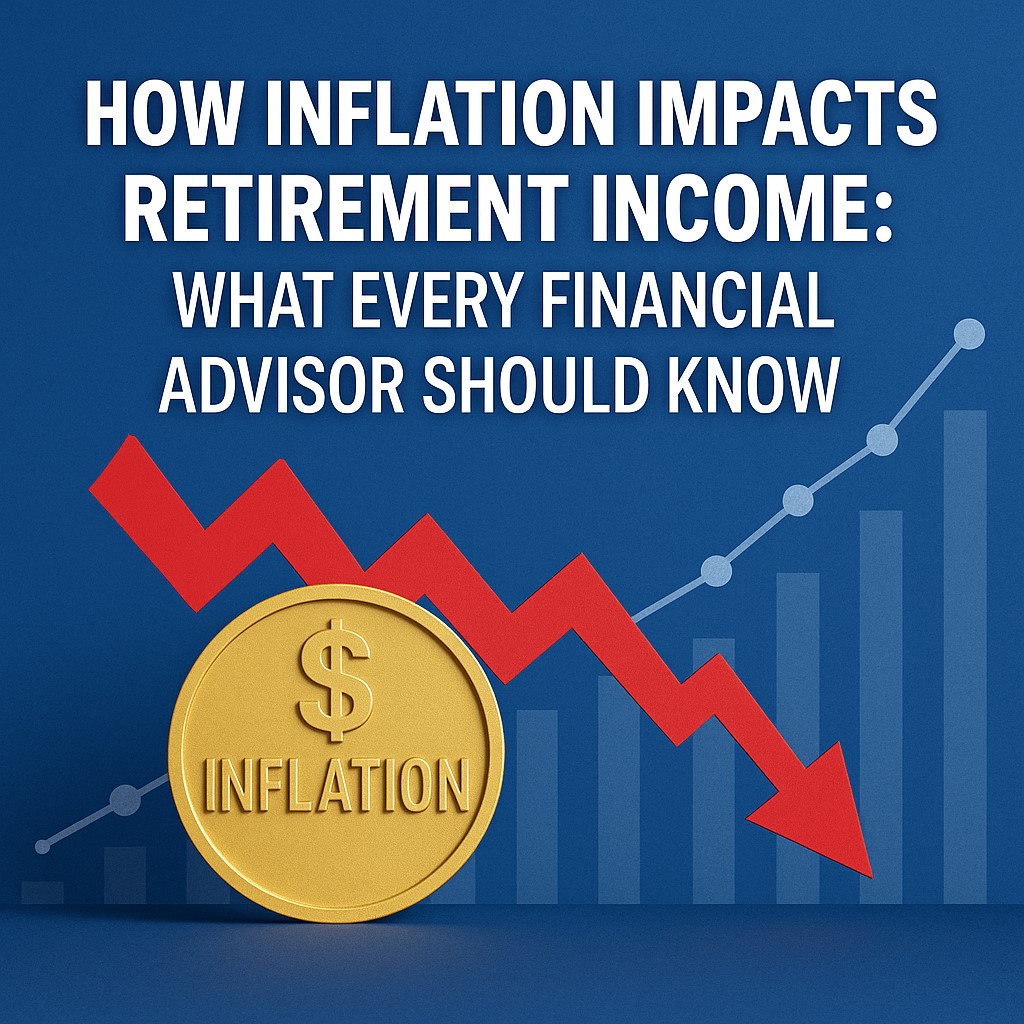
Introduction: The Unseen Threat to Retirement Income
Inflation has long been one of the most underestimated risks in retirement planning. While market volatility and taxes often dominate the conversation, inflation quietly erodes purchasing power, potentially putting even the most carefully constructed retirement plan at risk.
As a fiduciary financial advisor, it’s essential to guide clients—especially high-net-worth individuals, retirees, and those nearing retirement—through inflation-aware strategies that preserve their income, lifestyle, and legacy.
Understanding Inflation’s Impact on Retirement Income
Inflation refers to the general rise in the cost of goods and services over time. Even modest annual inflation can significantly reduce the real value of income in retirement.
Key Concerns for Retirees:
- Fixed income sources, such as annuities and pensions, may not adjust adequately for inflation.
- Essential expenses like healthcare, housing, and food often rise faster than the average inflation rate.
- A 2–3% annual inflation rate can cut purchasing power by 20–30% over a 15–20 year retirement.
Why Fiduciary Financial Advisors Must Prioritize Inflation Planning
Fiduciary advisors have a duty to act in their clients’ best interest. That includes anticipating long-term risks, like inflation, and building retirement income plans that are both flexible and resilient.
Here’s what every financial advisor should consider when helping clients combat inflation:
- Incorporate Inflation-Protected Assets
Assets that respond well to inflation should be a core part of a well-diversified portfolio.
- Treasury Inflation-Protected Securities (TIPS): These government-backed bonds adjust for inflation and can serve as a safe, low-volatility hedge.
- Real Assets: Investments in commodities, infrastructure, or real estate (especially REITs) often perform well during inflationary cycles.
- Dividend-Growth Stocks: Companies with a history of increasing dividends can help retirees maintain income streams that keep pace with rising costs.
- Build Income Strategies That Adjust Over Time
A static income plan is vulnerable to inflation over a multi-decade retirement. Advisors should structure flexible withdrawal strategies that evolve with market and cost-of-living conditions.
- Bucket Strategy: Segment assets by time horizon (short-term cash, intermediate bonds, long-term equities) to better manage risk and growth.
- Inflation Adjustments: Build in regular reviews to assess the client’s income needs against inflation trends, especially during high-spending years.
- Delayed Social Security: Encourage clients to delay benefits to increase their monthly income—one of the few inflation-adjusted income sources available.
- Reevaluate Fixed Income and Annuities
While fixed-income products provide stability, many do not account for inflation unless specifically structured to do so.
- Review any pension or annuity options for cost-of-living adjustments (COLAs).
- Consider laddered bond strategies that reinvest at potentially higher future interest rates.
- For clients interested in guaranteed income, inflation-adjusted annuities may be worth evaluating despite their higher upfront costs.
- Consider Healthcare and Long-Term Care Costs
Healthcare inflation typically exceeds general inflation—often by 5–7% annually.
This makes it one of the most significant and unpredictable retirement expenses.
Advisor strategies:
- Encourage clients to build Health Savings Accounts (HSAs) during their working years.
- Include long-term care insurance or asset-based alternatives in planning discussions.
- Project future healthcare needs and ensure portfolios can absorb rising medical costs.
- Monitor Policy and Economic Shifts
Interest rate changes, fiscal policy, and global events all influence inflation. As a fiduciary, staying informed enables you to proactively adjust your clients’ financial plans.
- Schedule annual or semi-annual reviews with inflation outlooks.
- Adjust asset allocations based on Federal Reserve policy or major economic indicators.
- Educate clients on how inflation expectations impact their portfolios, especially during periods of uncertainty.
Conclusion: Inflation Planning Is a Fiduciary Responsibility
Inflation is not just a line item in a financial plan—it’s a persistent threat to the longevity of retirement income. As a fiduciary financial advisor, your ability to proactively educate clients and adjust strategies accordingly is essential to preserving their financial independence.
By implementing diversified, inflation-aware strategies, you help clients maintain their lifestyle, safeguard their wealth, and navigate retirement with greater peace of mind.
Call-to-Action (CTA):
Is your retirement income strategy prepared for inflation? As a fiduciary financial advisor, I help clients build resilient, tax-efficient retirement plans designed to preserve purchasing power in any economic environment. Schedule a consultation today to ensure your income keeps pace with rising costs.
Global View Capital Management (GVCM) is an affiliate of Global View Capital Advisors (GVCA). GVCM is a SEC Registered Investment Advisory firm headquartered at N14W23833 Stone Ridge Drive, Suite 350, Waukesha, WI 53188-1126. 262.650.1030. Ryan Peca is an Investment Adviser Representative (“Adviser”) with GVCM. Additional information can be found at www.adviserinfo.sec.gov Global View Capital Insurance Services (GVCI) is an affiliate of Global View Capital Advisors (GVCA). GVCI services offered through Experior Financial Group, ASH Brokerage, and/or PKS Financial. GVCI is headquartered at N14W23833 Stone Ridge Drive, Suite 350, Waukesha, WI 53188-1126. 262-650-1030. Ryan Peca is an Insurance Agent of GVCI.
These views do not necessarily represent the views of GVCM or any of its affiliates. Investment involves risk.